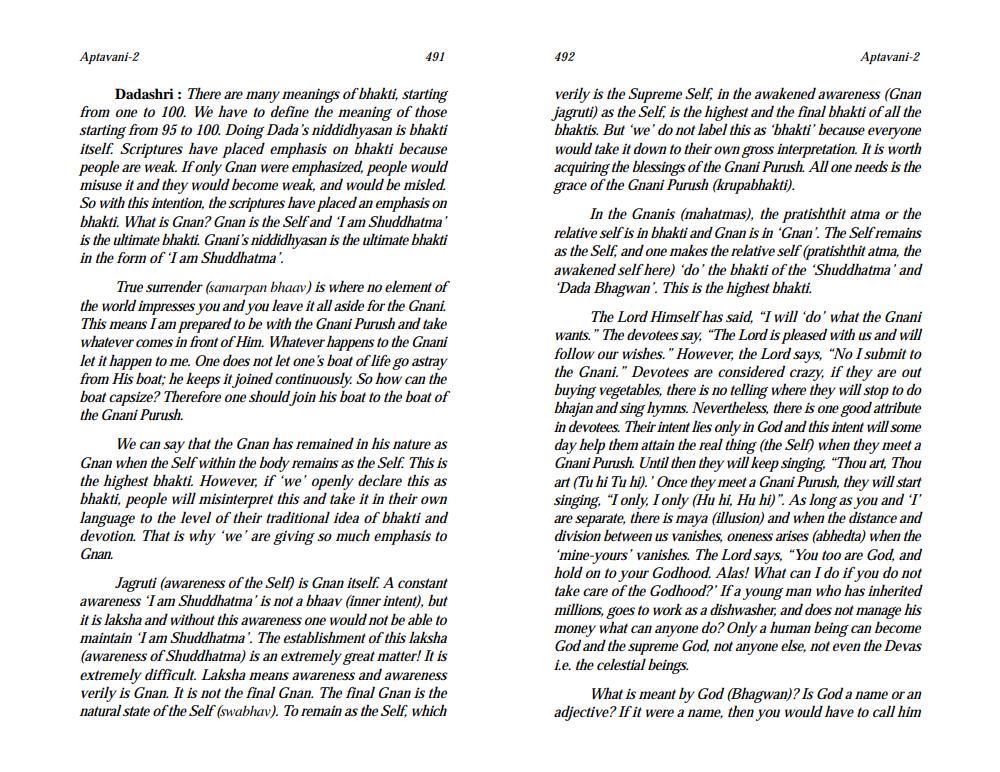________________
Aptavani-2
491
492
Aptavani-2
Dadashri : There are many meanings of bhakti, starting from one to 100. We have to define the meaning of those starting from 95 to 100. Doing Dada's niddidhyasan is bhakti itself. Scriptures have placed emphasis on bhakti because people are weak. If only Gnan were emphasized, people would misuse it and they would become weak, and would be misled. So with this intention, the scriptures have placed an emphasis on bhakti. What is Gnan? Gnan is the Self and I am Shuddhatma' is the ultimate bhakti. Gnani's niddidhyasan is the ultimate bhakti in the form of 'I am Shuddhatma!
True surrender (samarpan bhaav) is where no element of the world impresses you and you leave it all aside for the Gnani. This means I am prepared to be with the Gnani Purush and take whatever comes in front of Him. Whatever happens to the Gnani let it happen to me. One does not let one's boat of life go astray from His boat; he keeps it joined continuously. So how can the boat capsize? Therefore one should join his boat to the boat of the Gnani Purush.
verily is the Supreme Self, in the awakened awareness (Gnan jagruti) as the Self, is the highest and the final bhakti of all the bhaktis. But 'we' do not label this as 'bhakti' because everyone would take it down to their own gross interpretation. It is worth acquiring the blessings of the Gnani Purush All one needs is the grace of the Gnani Purush (krupabhakti).
In the Gnanis (mahatmas), the pratishthit atma or the relative self is in bhakti and Gnan is in 'Gnan. The Self remains as the Self, and one makes the relative self (pratishthit atma, the awakened self here) 'do' the bhakti of the 'Shuddhatma' and 'Dada Bhagwan. This is the highest bhakti.
The Lord Himself has said, "I will do what the Gnani wants." The devotees say, "The Lord is pleased with us and will follow our wishes. However, the Lord says, "No I submit to the Gnani." Devotees are considered crazy, if they are out buying vegetables, there is no telling where they will stop to do bhajan and sing hymns, Nevertheless, there is one good attribute in devotees. Their intent lies only in God and this intent will some day help them attain the real thing the Self) when they meet a Gnani Purush. Until then they will keep singing "Thou art, Thou art (Tuhi Tu hi). Once they meet a Gnani Purush, they will start singing, "I only, I only (Hu hi, Hu hi)". As long as you and 'I' are separate, there is maya (illusion) and when the distance and division between us vanishes, oneness arises (abhedta) when the 'mine-yours' vanishes. The Lord says. "You too are God, and hold on to your Godhood. Alas! What can I do if you do not take care of the Godhood?' If a young man who has inherited millions, goes to work as a dishwasher, and does not manage his money what can anyone do? Only a human being can become God and the supreme God, not anyone else, not even the Devas i.e. the celestial beings.
We can say that the Gnan has remained in his nature as Gnan when the Self within the body remains as the Self. This is the highest bhakti. However, if 'we' openly declare this as bhakti, people will misinterpret this and take it in their own language to the level of their traditional idea of bhakti and devotion. That is why 'we' are giving so much emphasis to Gnan.
Jagruti (awareness of the Self) is Gnan itself. A constant awareness 'I am Shuddhatma' is not a bhaav (inner intent), but it is laksha and without this awareness one would not be able to maintain 'I am Shuddhatma'. The establishment of this laksha (awareness of Shuddhatma) is an extremely great matter! It is extremely difficult. Laksha means awareness and awareness verily is Gnan. It is not the final Gnan. The final Gnan is the natural state of the Self (swabhav). To remain as the Self, which
What is meant by God (Bhagwan)? Is God a name or an adjective? If it were a name, then you would have to call him




